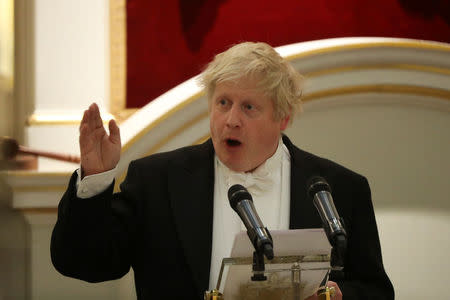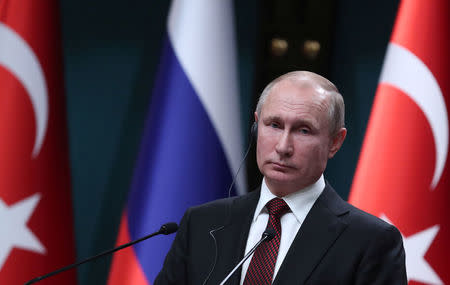Boris Johnson condemned after 'categorically' blaming Russia for spy poisoning

Boris Johnson faces further embarrassment over his reaction to the Salisbury spy poisoning amid accusations he ‘exaggerated’ evidence linking Russia to the attack and the Foreign Office deleted an inaccurate tweet.
Mr Johnson has come under fire after an announcement on Tuesday that Porton Down scientists had not verified the source of the Novichok nerve agent believed to have been used in the March 4 attack on Sergei and Yulia Skripal.
The statement appeared to contradict claims made by the Foreign Secretary in an interview on German TV on March 20.
Asked why the UK believed that Russia was the source of the nerve agent, Mr Johnson said: ‘The people from Porton Down, the laboratory, they were absolutely categorical. I asked them that myself. I said ‘Are you sure?’. He said ‘There’s no doubt’.’
4/ Theresa May was guarded with her words. She said they could prove what the nerve agent was and that it was likely to have been used by the Russian state. However @BorisJohnson said officials at Porton Down told him the evidence that it was Russian was “absolutely categorical” pic.twitter.com/W6O77vQHoS
— Chris Williamson MP (@DerbyChrisW) April 3, 2018
In mid-March, Mr Johnson had gone even further, pointing the finger of blame directly at the Russian President.
‘Our quarrel is with Putin’s Kremlin and with his decision,’ he said, ‘and we think it is overwhelmingly likely that it was his decision to direct the use of a nerve agent on the streets of the UK for the first time since the Second World War.’
Tweet deleted
The Foreign Office’s embarrassment has been further exacerbated after it emerged a message stating that Porton Down had established that the Novichok nerve agent came from Russia was deleted from its Twitter feed.
The tweet, issued on March 22, said: “Analysis by world-leading experts at the Defence Science and Technology Laboratory at Porton Down made clear that this was a military-grade Novichok nerve agent produced in Russia.”
The Russian Embassy was quick to point out the error on Wednesday afternoon.
Why would @foreignoffice delete this tweet from 22 March? pic.twitter.com/Nvu1BfJw9J
— Russian Embassy, UK (@RussianEmbassy) April 4, 2018
A Foreign Office spokesman said it had been an inaccurate summary of comments made by the UK’s ambassador to Russia, Laurie Bristow, at a briefing in Moscow, which the FCO had been live-tweeting.
Labour on the offensive
Speaking during a local election campaign visit to Watford, Mr Corbyn said of Mr Johnson’s comments: ‘He claimed categorically – and I think he used the words 101% – that it had come from Russia. Porton Down have not said that, they said that they’ve identified it as Novichok, they cannot identify the source of it.
‘Either the Foreign Secretary has information that he’s not sharing with Porton Down or it was a bit of exaggeration. I don’t know which it is, but I think we need a responsible, cool approach to this.
‘We need to get to the source of this to prevent it ever happening again.’
Shadow home secretary Diane Abbott has said the development raises questions about the Government’s approach, and said Mr Corbyn should now be given credit for demanding more evidence before allocating blame.
‘It doesn’t surprise me Porton Down is saying this because the security services were always very cautious in what they said,’ Ms Abbott said.

Putin’s response
On Tuesday evening, Mr Putin seized on the comments from Porton Down as he accused the UK of launching an ‘anti-Russian campaign’.
He called for a thorough investigation into the poisoning, saying that ‘the speed at which the anti-Russian campaign has been launched causes bewilderment’.
And Russia’s media also targetted Mr Johnson.
Responding online, Russia Today claimed that his position as Foreign Secretary was ‘in jeopardy’ after the controversial comments.

The news site, often considered the international mouthpiece of the Russian state, reported: ‘Boris Johnson put his post in jeopardy after possibly lying about Russia being proven as the source of a nerve agent used in the Skripals’ poisoning.’
And Russia’s EU ambassador Vladimir Chizhov insisted that the nerve agent ‘could have been manufactured anywhere’.
Russian news agency Tass quoted Mr Chizhov as saying he was ‘not surprised’ by Mr Aitkenhead’s comments, as Novichok ‘is widely known – its formula is even available on the internet’.
International meeting
Russia is expected to restate its denial of responsibility at Wednesday’s meeting of the OPCW’s executive council behind closed doors in The Hague.
Moscow says it has 20 questions it would like raised at the meeting which, apparently, will enable a ‘final line’ to be drawn under the row.
Britain’s delegation to the OPCW branded Russia’s call for a joint UK/Russian investigation into the Salisbury poisoning ‘perverse’.
In a tweet issued as the OPCW’s executive council met at Russia’s request in The Hague, the UK delegation said: ‘Russia’s proposal for a joint, UK/Russian investigation into the Salisbury incident is perverse.
‘It is a diversionary tactic, and yet more disinformation designed to evade the questions the Russian authorities must answer.’

 Yahoo News
Yahoo News 

